
At this point, the formula for a Kurt Vonnegut novel is so clear and familiar that it's almost completely transparent, but they're still so enjoyable to read that it's hardly worth caring. Like a lot of his work, Deadeye Dick is less a novel with a plain, straightforward narrative and more of a jumbled memoir of a character who seems like some possible version or aspect of Vonnegut himself, examining the absurdities of life and America and society through events that range almost everywhere on the scale between hilarious and depressing. He had his method down to a science by the 80s, and the result is yet another easy to read book that I liked a lot and wouldn't mind going through again.
This particular book is about Rudolph Waltz, a man born in the 1930s to very silly parents and whose entire future is affected when he accidentally does something horrible when he's twelve years old. We learn a lot about his life and the lives of his close family members, and also little snippets about the various other residents and famous events in Midland City. As far as recurring Vonnegut elements go, the novel returns to science fiction with the concept of a neutron bomb that can wipe out the residents of a town without actually affecting the non-living landscape, and it shares a location and some characters with Breakfast of Champions. I'm not sure that the two stories can actually be reconciled into a single continuity, but that was never the point of Vonnegut's writing anyway. Deadeye Dick isn't his most innovative or surprising work, but it's still a very entertaining and occasionally poignant novel, which is pretty much the writer's real trademark.
Tuesday, January 31, 2012
Deadeye Dick
Monday, January 30, 2012
Fawlty Towers

Fawlty Towers is a sitcom co-written by and starring John Cleese as Basil Fawlty, the eccentric and put-upon owner of a small hotel in England. Coming not long after Monty Python's Flying Circus wrapped up, it's kind of surprising how standard a show it is, but it manages to be very funny regardless, and with him playing so many small parts while working as a member of Monty Python, it's hard not to say Fawlty is the best character Cleese ever played. The show takes place almost entirely inside the hotel, and the plots revolve around the mishaps and misunderstandings that seem to occur on a daily basis, as Fawlty butts heads with his wife, his dimwitted Spanish waiter, and the various guests who rent rooms. Other recurring characters include a couple older longterm renters with a few running jokes and Polly, a part-time assissant played by Cleese's writing partner and then-wife Connie Booth, but who doesn't do much besides occasionally help Fawlty with his elaborate attempts to conceal problems from his guests and his wife.
The show is a little hit and miss, because while it's almost always funny, some of the episodes revolved around plot ideas that are fundamentally frustrating for a viewer. I realize that it's sitcom convention for small lies to balloon into big ones very quickly, but when the small lie that starts things off seems unnecessary in the first place, it can lead to a whole storyline being irritating to watch even while the individual gags can still be quite funny. The best parts of the show are when Fawlty is matched up against a guest who happens to be a huge pain in the ass to begin with, and the comedy comes from both his befuddlement and abrasive rudeness in response. Things usually escalate in a remarkably madcap fashion, often ending in complete chaos at the end of the episode. The best one was probably the finale of the first season, which begins with Basil running the place by himself while his wife is in the hospital and ends with him trying to do the same while heavily concussed and failing to avoid upsetting a group of German guests. I don't think anyone will ever call Fawlty Towers much of an innovative show, but that doesn't prevent it from still being wonderfully entertaining and laugh-out-loud funny over 30 years later.
Sunday, January 29, 2012
Movie Update 37
You know what's up.
Crimewave

This is the only produced Coen brothers script that the brothers didn't direct themselves, though the duties were taken by their friend Sam Raimi. It combines elements of both of their careers in film, and combines them to create what might be best described as a live action Looney Tunes movie. The subject matter is darker, but the actual content of the film really isn't. When a man hires a couple of goons with silly voices to kill his business partner after finding out about his betrayal, they end up going on a rampage through the city, with one of the man's employees and a girl he meets getting caught up in it. It's a very strange and silly movie, with some very elaborate comedic setups, surprisingly exciting moments of action, and an entertaining appearance by Bruce Campbell. A bizarre film that you'll probably like if you're a fan of the filmmakers involved.
Dracula
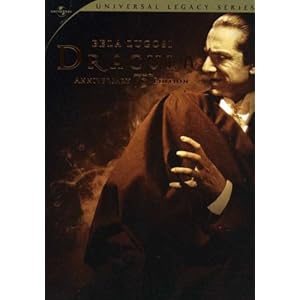
It's always interesting to me how sterile and stately the horror films of the 20s and 30s are. Genre icon Bela Lugosi stars in his signature role, instilling Dracula with charm and menace as he moves from Transylvania to London in order suck a lot of blood. It's of course pretty toothless in comparison to modern vampire stories, but I mostly enjoyed the slow discovery by the other characters of what Dracula really is and their calm attempts to prevent him from killing or enslaving any more women. Heh, toothless.
One from the Heart

Post-70s Francis Ford Coppola continues to make absolutely no sense to me. One from the Heart tells the story of a couple in Las Vegas that finds their relationship falling apart, and their struggles to either resolve their differences and move on with their lives. What makes the movie different is its musical quality - the characters don't really sing, but the original music by Tom Waits pervades the whole thing, it frequently dabbles in an unreal sense of space, and the film is entirely and totally obviously filmed on elaborate sets at a soundstage. The movie's budget problems and failure at the box office cost Coppola a ton of money, and a lot of his career from then on can be attributed to continued financial problems. Was it worth it? Uh, not really. The movie is okay.
Witness for the Prosecution

A courtroom drama directed by Billy Wilder, based on a play, based on a story by Agatha Christie. Other actors get higher billing, but the star of the show is definitely Charles Laughton, an aging English lawyer who was recently released from the hospital and decides to take on the defense of a man accused of murder, against his doctors' wishes. The trial itself is pretty straightforward, until the characters start making unexpected choices and Laughton has to stay on his feet to deal with the changes and continue the defense to his best ability. The ending is so twisty that a voice actually advises the audience to avoid spoiling it to their friends so they can enjoy it too. It's a well-made and wonderfully acted legal drama that wraps up satisfyingly without letting anything come too easily.
Saturday, January 28, 2012
Chuck - Season 5

For its entire existence, Chuck has been an uneven show. There are some things it has always done well, mostly involving making its central characters sympathetic and likable, though they've been known to make annoying decisions at various points. There are some things it has had trouble doing consistently, but can often manage. It is occasionally very funny, though it also often isn't, especially when they return to the Buy More for yet another boring B story. And there are some things it has never quite gotten right, mostly involving the spy stuff. It will have moments of inspiration or clever homage, but it's often buried in too many references or plotting that is just poorly thought out and irritating. None of these aspects of the show really changed in the show's brief fifth and final season, but I would say it's probably the show's best since the second, because the action/drama side was at least occasionally competent, and the focus was on giving those likable characters fitting conclusions, and they all got fitting and occasionally touching send-offs, even Jeff and Lester, the bozos who are usually tolerable at best.
The silly idea of the Intersect has always been central to the spy aspect of the series, and that's once again the case this time, though they thankfully managed to put a twist on it by no longer having it stuck in Chuck's head the whole time. It's still the center of the plot though, as a bunch of guest actors and returning villains are brought on and dealt with in rapid fashion as the show teases some possible story arcs but doesn't really stick with any of them for a long time. The last handful of episodes do finally build a sense of momentum with a bad guy who lasts more than an hour, and a gut punch of a plot twist that is surprisingly effective considering how terrible the scene in which it occurs is. It leads to an ending that is not quite the comfortable fairytale finale I was honestly expecting, but is still a touching and hopeful one that does justice to characters who have maintained my affection despite the show's many ups and downs over the years. Chuck was never as good as I wanted it to be, never managing a way to mix espionage and humor in a way that does justice to both, and never quite doing enough with a protagonist that manages to be relatable to nerds rather than an irritating stereotype of one. But while it had flaws, it never stopped being easy to root for, and I'm glad the creators got the opportunity to end the story in an acceptable way despite the series never really growing beyond its small but dedicated audience.
Monday, January 23, 2012
The Legend of Zelda: Skyward Sword

The first regular Zelda game on a console in five years came out as the Wii's life cycle began to wind down to a close, perhaps too late for it to have a major impact on the gaming landscape. I think Skyward Sword is a really good game, and I certainly had more fun with it than I did with Twilight Princess. But Twilight Princess came out in 2006, and Skyward Sword doesn't do enough differently to be as notable as that game was at the time. People were hoping for Nintendo to really do something different with the series, and while they made a polished and enjoyable adventure, it's not much different from what we're used to.
I do generally like the setting and general story of Skyward Sword - it goes back to the beginning of the series, and shows the origin of a number of elements that have recurred often throughout the twenty five years that they've been making these games. The game's a bit slow to get going, features repetitive dialogue, and has some interludes that don't really lead anywhere, but the game was designed well enough that it didn't really feel like a slog before it got going. There's a bit more to the characterization than there was in the past, too. It's hard to really develop the cast too much when they don't really speak and almost all of their dialogue is exposition, but the main players felt more like people than they usually do. And while I'm tired of gorons at this point, they did make a point to introduce several new types of creatures.
The game follows a familiar structure, starting you in an introductory area to learn the ropes, slowing allowing you to enter new areas, and accomplishing various tasks in between trips into dangerous, puzzle-filled dungeons that are the meat of the gameplay, before eventually pushing you toward an endgame that leads to the final boss fight. The sections between dungeons were more involved with usual, and while they aren't quite as tricky, they do feel like real, focused challenges rather than filler you have to do before you're allowed to advance. You will acquire items you need to get past certain obstacles, learn to fight new enemies, and encounter interesting things in the world before you can advance. I also thought they did a good job with side quests this time, or at least it seems that way since I did more of it than I have since Majora's Mask came out. A lot of it revolves around Skyloft, the town in the clouds you start the game in, which isn't particularly big but is filled with people who have a problem they need help with or some useful equipment to sell you.
It's interesting to look at how the dungeon design has changed over time with these games. The older 3D games had lots of simple, repeatable challenges like having to light torches or push blocks, and tons of locked doors with tons of keys to unlock them. Over time the design has gotten more focused, with fewer keys and more specific, location based puzzles as the technology and sophistication of the design has improved. I wouldn't say they're necessarily more fun, but they're thought through a little better. The boss fights are about what they always are - some are tougher than others, none are truly frustrating, and they all test what you've learned and the items you've found in unexpected and satisfying ways. The biggest problem I had with most of them though tended to revolve around the controls - the Wii version of Twilight Princess had you swing the remote to make Link swing his sword, but Skyward Sword is much more specific about it, with every item depending on your ability to aim or swing precisely with the remote. It's a function system, and the way it influences the combat is interesting, but there were often still issues getting it to work precisely and it led to a few frustrating moments.
One problem the series has always had that Skyward Sword fixes is that there's actually a use for all the money you find. You don't have to worry so much about the size of your wallet, and you can buy things like potions (which are actually useful since fairies don't fill your health bar up any more), larger pouches for your ammo, and special gear with various uses, and you can also collect bugs or rare treasures to pay for upgrades to your gear. I still say Zelda is an action adventure, but these changes make the game feel a bit more substantial and closer to an RPG. Something they haven't fixed is the feeling of the game being padded out a bit, which is especially noticable towards the end. Yes, there's another lengthy segment that feels suspiciously like a fetch quest, and while there's enough unique stuff to do that it isn't entirely lazy, it does feel unnecessary since the game is plenty long without it - I left a fair amount of optional content on the table, and the game still took me 40 hours to beat.
Skyward Sword definitely has a few warts, and it's hard to shake the feeling that the Zelda series is behind the times, even ignoring the fact that the Wii can only display it at 480p in the year 2012. But it's still a Zelda game, and that means it's a charming adventure with some enjoyable dungeon and combat design, and an experience that's entirely comfortable to sit through. Perhaps that slight lack of ambition keeps it from being an absolutely classic game, but it's still one I'm totally glad I took the time and effort to play.
Monday, January 16, 2012
Movie Update 36
These were expiring, so I watched them. Yep.
Ball of Fire

A screwball comedy directed by Howard Hawks, featuring Gary Cooper playing off type as an awkward, stuffy intellectual and Barbara Stanwyck playing very much on type as a club singer and mob boss' girlfriend who helps him and his fellow encyclopedia writers come out of their shells. Ball of Fire is mostly an enjoyable movie, though there's definitely something very weird about it. The professors are all pretty likable guys, but it's just a little uncomfortable seeing them all fawn over a young and attractive woman, even if it's innocent. The shift from her using them to avoid the police to actually getting romantically interested in Cooper is pretty abrupt as well. As I said though, it's mostly a fun movie.
Deathtrap

Sidney Lumet movies are often based on plays or feel like they could be, taking place in a small number of locations and not being particularly visually flashy. That's definitely the case with Deathtrap, though I think the entire thing being limited mostly to a single house works in its favor. Deathtrap was a play about writing a play based on a murder, and the fact that the movie version isn't a play itself does do a little to remove some of the inherent cleverness of the structure. But the story still works, and the performances by Michael Caine and Christopher Reeve are really good. I can't say as much about the other characters, but it's both an amusing and incredibly tense movie at times, with some great twists and surprises.
The Life and Death of Colonel Blimp

It was a big surprise for this movie to be in color, though apparently that was a thing for its makers Powell and Pressburger while most directors from the 40s were still working in black and white. The movie is based on British cartoons about a blowhard English military man, though it tells an original story about how such a man might come to be like that over a lifetime of fighting in wars. Roger Livesey and Anton Walbrook give a pair of great performances, first as young soldiers, then as middle aged veterans of the first World War, then as old relics at the beginning of the second. There's also an amusing bit with Deborah Kerr playing three different women who all look the same at various points in his life. The movie is concerned with many things, but the main one I thook away from it is how a lifetime of experiences can affect a person and make them who they are. A great and refreshingly civil war movie.
Odd Man Out

Carol Reed's The Third Man is a classic of the noir genre, though I can't say I enjoyed Odd Man Out nearly as much. It has an interesting subject, with James Mason playing an IRA leader who gets wounded and stranded in the middle of Belfast (though the film is not actually explicit about either of those references). There are some interesting moments sprinkled throughout, though I was mostly kind of bored while I was watching it, which shouldn't happen with a movie about hiding from the police and troublesome politics. I didn't think it was bad, I was just rarely actively intrigued by what was happening, and with a genre that thrives on intrigue, it was disappointing.
Sunday, January 15, 2012
The American President
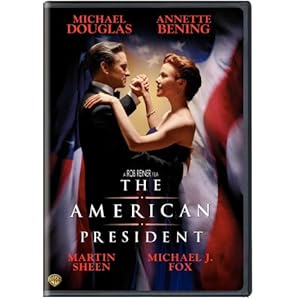
It was pretty amazing how much this felt like an alternate universe's version of The West Wing. Aaron Sorkin wrote it, in much the same style as the show, with lots of intelligent back-and-forth dialogue and well-timed dramatic speeches. It has a movie budget with a movie cast and a movie director in Rob Reiner, but it's filmed pretty plainly and on the same sets as the show. Most of the characters have pretty clear equivalents from the show. Michael Douglas' President Andrew Shepherd is not that different from Josiah Bartlet, and Martin Sheen even plays a chief of staff similar Leo from the show. It shares a couple other cast members like Joshua Malina, and the rest of the actors are a mostly recognizable bunch, playing roles they might have played on television had they not been more successful. Michael J. Fox is another member of the staff, and Richard Dreyfuss plays a Republican senator with designs on the presidency.
The focus is a bit different than The West Wing though - while it does get into some of the nuts and bolts of politics, particularly the wrangling it takes for controversial bills to get through, it's mostly in the service of a romantic plot that's the real core of the story. The President is a widower due to his wife's death before his election, and he hasn't been really looking to date while in office. Annette Bening plays a lobbyist who gets a job in Washington, but things quickly get weird when she and the President hit it off and they start seeing each other regularly. There's a lot about whether a President, even a very popular one, could ever have a non-marital relationship in office in this day and age.
Dreyfuss' character is cartoonishly evil and slimy, and uses the situation to smear the President, who doesn't stoop to defending his personal life despite falling approval ratings. His personal and professional lives though finally collide near the end, once the health of his political goals come into conflict. It's a bit more silly and outlandish than anything you'd normally see in a regular story of politics, but it's not a politics movie - it's a romantic comedy with a political setting. It does the job well enough, but I'm glad Sorkin didn't get it out of his system and went on to use a lot of his ideas to create one of the best TV dramas of the last decade.
Saturday, January 14, 2012
Rise of the Planet of the Apes
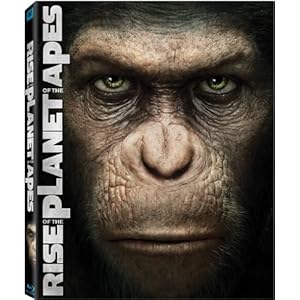
The only movies in this series that I've seen previously are the original and Tim Burton's terrible remake. I like the first movie, but I didn't have much hope for another attempt to revive the concept, even if a story about how apes taking over the planet might actually happen is more interesting than just doing the first movie again. I was surprised by how much I enjoyed it, though. Rise of the Planet of the Apes is certainly flawed - the science is mostly pretty silly, and a lot of the human characters are generic summer movie tropes with nothing to them. But the movie does a few key things right, and the result is a perfectly solid popcorn movie, and the rare kind of one that actually has a soul.
The key to the whole movie is the realization of the character of Caesar, as performed by motion capture veteran Andy Serkis and animated by Weta. If they didn't have him as a central figure around which to base the story, they wouldn't have that much. But by establishing the character and using him so well, they turned what could have been a simple monster movie into something more complex and interesting. What's so different about the movie is that it's not clear what exactly we're rooting for. Normally that would be a problem, but here that conflict is an essential part of what makes the whole idea interesting. In the end, it's clear that the apes are not the bad guys - man's own hubris is. And while that's not exactly a new idea in the realm of science fiction, for once I didn't feel like an anti-science message was being rammed down my throat. It wasn't that we are wrong to try to advance medicine by playing god, it's that sometimes there are unforeseen consequences in the relentless pursuit of power and profit. And I was fine with that.
The reason the apes aren't outright good guys, besides the fact that their victory means the eventual extinction of humanity (as humans we are naturally inclined to be against the death of all humans), is James Franco's character, a scientist who's pushing hard on a drug that allows brain cells to repair themselves and could potentially cure victims of degenerative diseases like Alzheimer's, which his father has. I don't understand why John Lithgow was cast as the father when it's not a significantly meaty role and his mere appearance makes most people get ready to start laughing, but he helps humanize Franco, along with his girlfriend played by Freida Pinto, who pretty much only exists in the movie because they wanted a female character.
When one of the apes the drug is being tested on gives birth and Franco is forced to care for the baby, he both realizes that the drug has intelligence-improving as well as restorative potential and develops a strong bond with the ape. Their connection is what drives most of the drama and more heart-wrenching moments in the story, and Franco and Serkis make a good pair, even if only one of them is ever actually on screen. As Franco's reluctance to continue pursuing the drug grows in the face of the dollar signs growing in his boss' eyes, a more outright conflict develops as more apes get their cognitive abilities boosted and Caesar becomes a Spartacus-esque figure (sort of ironic given his name, I guess). It builds to a climax that is more complex than summer movies usually go for, and the ending does plenty to seed a sequel that could take place either soon after or much later, closer to the time of the "beginning" of the story. I'm not sure which I'd rather watch, but I will say I enjoyed this movie the most of three that I've actually seen. As dopey as some of the characters in Rise are, and as much as I didn't like it going back to the well on some of the original's famous lines, it's still overall a less silly and more competent film.
Thursday, January 12, 2012
Best Shows of 2011
Once more, with feeling: this list was chosen from seasons of shows that had their season finale air in 2011. So for the network shows, material that occurred way back in the fall of 2010 is relevant, and the brand new seasons aren't. It's just the only way to make it work, okay? I don't see the value in looking at it otherwise. Stop looking at me like that.
Best of 2011
10. It's Always Sunny in Philadelphia (FX)
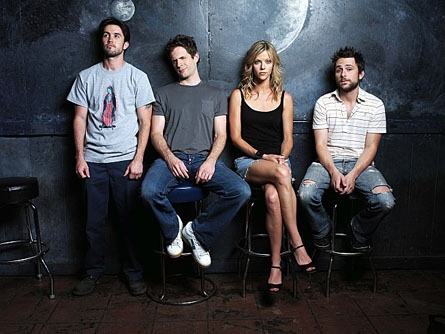
It's Always Sunny doesn't have the human core that it would take to be my favorite comedy on television right now, but that's by design. It's about a bunch of loudmouth jerks who do terrible things to each other, and that's been the launching point for a lot of great comedy in the last seven years. Just going by the strength of the laughs, this was one of the better seasons in the show's run, which is quite a feat considering how generally consistent it is with its cast and its writing. It's not that new anymore, but what they're doing is still so good that I don't really care.
Favorite Episode: "Frank's Pretty Woman"
9. Sons of Anarchy (FX)

This could have possibly ended up higher on the list if the finale turned out differently, but it was still an exciting, tension-filled season of a show that does a great job of balancing baser thrillers like gun fights and car chases with some really strong human drama that drives everything. It turned out to be sort of a table setting season in the end, but the journey to reach its lukewarm conclusion was at times as brilliant as anything else I saw on TV last year.
Favorite Episode: "Hands"
8. Parks and Recreation (NBC)

The third season of Parks and Rec built wonderfully on the second, continuing to develop its ensemble cast into one of the most lovable bunches on television while adding two more talented people to its cast in Adam Scott and Rob Lowe. They also did a lot to gradually turn Pawnee, Indiana into one of the most fully developed and enjoyable fictional towns in TV history. It's just a show that's always growing, and never feels like it has to stop. It doesn't blow my mind as much as shows higher on this list, but it's wonderful all the same.
Favorite Episode: "Media Blitz"
7. Louie (FX)

I don't know if I'd like Louie more if the show made more of a concerted effort to be funny. Because as much as I love the fact that Louis C.K. can do pretty much anything he wants with the show, and am frequently moved or affected by some of his wilder experiments, I still often find myself thinking that the inserted moments of his regular stand-up comedy are the most enjoyable bits of the show. Still, it's hard to fault the show for what it is; an incredibly honest and inventive series that's more concerned with doing something different and interesting than making you laugh a few times. That's admirable, and the show is good enough to pull it off.
Favorite Episode: "Oh Louie/Tickets"
6. Game of Thrones (HBO)

You know I think was a strong year for drama on cable when a nearly perfect adaptation of one of my favorite books is my fifth favorite. George R. R. Martin's fantasy series is the definition of meaty, and television would be the only reasonable way to adapt it without totally gutting the story. That some things are simplified or lost in translation is besides the point - Game of Thrones is highly successful at bringing the series to a larger audience, and is a lot of fun to watch whether you're familiar with the books or not. The production values and quality of the cast are outstanding for television, and the dark, unforgiving world the story takes place in fits right in with the gritty cable feel. Again, not perfect, but plenty good enough.
Favorite Episode: "The Pointy End"
5. Boardwalk Empire (HBO)

For a lot of these dramas, the favorite episode is somewhat randomly chosen. Pretty much episode has something good to it, and what it comes to is which one had that one killer moment that jumps out more than the rest. Boardwalk had a very successful debut last year, and it was improved this time around, expanding on the scope of its examination of the way crime and politics intertwine in early 20th century America, and giving more time for all of its characters to grow into believable people that you care about. It's a bit too stately and concerned with symbolism to match the gripping personal intensity of HBO's very best crime dramas, but it's still damn good and always fun to watch.
Favorite Episode: "Ourselves Alone"
4. Homeland (Showtime)

Looking back, this might be the only brand new show that I watched in 2011. And if that's the case, it was a darn good pick. What starts out as a nice paranoid spy thriller quickly grows into something more, as the characters doing the watching start interacting with the watched, and it turns into a messy smashing together of personal and political turmoil. The show doesn't quite have the breadth of other dramas on this list, being so focused on a single story and a small group of characters. But what they do with that limited scope is very impressive, and worth celebrating.
Favorite Episode: "Marine One"
3. Justified (FX)

For some reason, the first season of Justified was more concerned with telling a bunch of cool little modern cowboy stories than creating a real story for its great main character, and that seemed to be the case for a little while in season two as well. But it wasn't long before it became clear what the greater plan was, as smaller squabbles gave way to an incredibly compelling story of deep rooted family rivalries in a dangerous community that never forgets past slights. Margo Martindale gave a supporting performance for the ages, and just like that, the show morphed from a solid, stylish police drama into something much greater that everyone should watch.
Favorite Episode: "Brother's Keeper"
2. Community (NBC)

Community doesn't have the consistency of tone and content that other shows might have, that probably help them establish larger and more casual audiences who know what to expect when they turn the TV on. Community's eccentricity might have contributed to its low ratings, and its removal from the spring schedule and possible eventual cancellation before it was even nearly done telling stories. But if removing the less safe elements of the show so it could stay on the air a few years longer meant that it wouldn't be as potentially exciting, unique, and simply hysterical as it routinely is, I wouldn't make that trade. The second season of the show took a lot of risks, but they almost all paid off and helped create one of the best single seasons of a sitcom I have ever seen.
Favorite Episode: "Abed's Uncontrollable Christmas"
1. Breaking Bad (AMC)

Another year, another first place finish for Breaking Bad. I can't help it. There's just no show that combines a unique visual flair, stupendous acting, dark humor, and a shocking and unpredictable plot like Breaking Bad. I don't quite think it was better this year than it was last time, but I was impressed with how they managed to shift the focus away from Walt without compromising the show's unerring watchability or the long term goals that they're striving toward. And with the way the spotlight returned to him as the season ended, it reinforced my belief that he is the most interesting, and doomed, protagonist on TV today.
Favorite Episode: "Crawl Space"
Wednesday, January 11, 2012
Best Albums of 2011
I still find myself to be more concerned with trying to appreciate the whole history of modern music than making sure I stay up to date, but I did a decent job of buying new albums. Most of it is from the year's first half, though.
Best of 2011
8. Fleet Foxes - Helplessness Blues
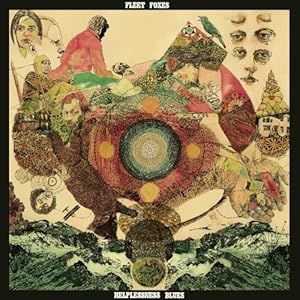
Fleet Foxes' second album isn't as original as their first, and for good reason - it's pretty much the same thing again. Still, that same thing is very enjoyable, and it's hard to fault the band for sticking with what they know and can do well. A folksy but still distinctly rock-influenced sound, and nice vocal harmonies playing off the singer's strong voice. I find it hard not to like it a lot.
Favorite Song: "Helplessness Blues"
7. James Blake

Most people probably think they have a pretty good idea of what dubstep is, but I doubt many of them think of something like this. James Blake likes to use the bass, but he does so sparingly, just like all of the other elements at his disposal. It's very sparse music, perhaps too sparse in some places, but the results are often worth it, slowly building up to and then releasing tension in profoundly effective ways. Plus the guy has a great voice, something you don't usually hear about electronic musicians.
Favorite Song: "I Never Learnt to Share"
6. Radiohead - The King of Limbs
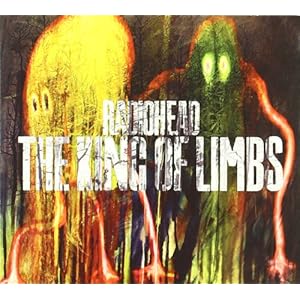
It's unusual for there to be a new Radiohead album that isn't a huge game changer, but that doesn't mean a perfectly normal album by them won't still be really good. And The King of Limbs, despite being a bit lean on running length, is definitely good. Its eight tracks experiment with sounds and styles the band has played with before, but does enough with them to make it definitely worth plenty of listens on its own. They're a band that's expected to reinvent music every time out, but as long as they stay as good as this, I'll be fine with it.
Favorite Song: "Give Up the Ghost"
5. St. Vincent - Strange Mercy
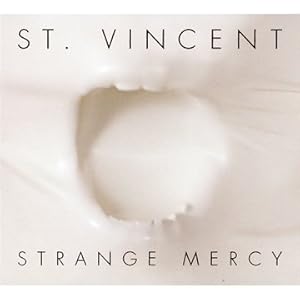
I wasn't quite sure what to expect from this considering my vague memories of having heard St. Vincent before, but I guess it turned out to be her most straightforward record. It's pretty much her guitar, her voice, and some drums, with a few bells and whistles here and there. It's accessible but also unique, a nice match of elements that are familiar with ones that feel distinct. She has a really nice voice, and most of the main vocal hooks have a tendency to get inside your head and stay there for a while. It turned out to be a really good blind buy.
Favorite Song: "Chloe in the Afternoon"
4. TV on the Radio - Nine Types of Light

Perhaps the band's least exceptional album, but the core of what they do is just so interesting me that I can't help but like it a lot every time I hear it. I'm not sure if they'll ever get back to a dirtier and more soulful sound, but simple high quality indie rock infused with the influence of African American culture is plenty fine on its own. Just a fun album all the way through.
Favorite Song: "Will Do"
3. M83 - Hurry Up, We're Dreaming
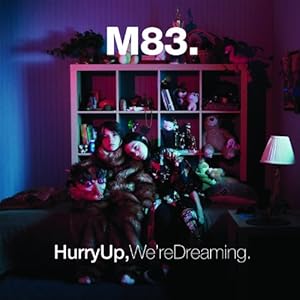
Hurry Up is a double album, but a pretty slight one. On one hand that's a bit disappointing since it doesn't feel as grand as some other albums in the same format, but on the other it's pretty remarkable that something that lasts this one is so easy to get all the way through. The music freely mixes elements of electronic and rock, and produces a number of catchy, memorable songs. Maybe a bit too much time is spent on minor experiments and mood pieces, but the overall effect is a highly enjoyable listening experience.
Favorite Song: "Midnight City"
2. The Antlers - Burst Apart
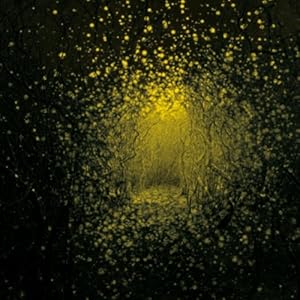
Bust Apart is not as emotionally powerful as The Antlers' last record, but it was never going to be. They decided to shift gears a bit and do something with more of an electronic sound to it, without abandoning their roots, and I like it a lot, if maybe not as much as Hospice. There's nothing too showy over the top here, it's just a bunch of songs that flow well together and are filled with beautiful noises. It doesn't demand attention, but if you do listen, it's very good.
Favorite Song: "No Widows"
1. Panda Bear - Tomboy
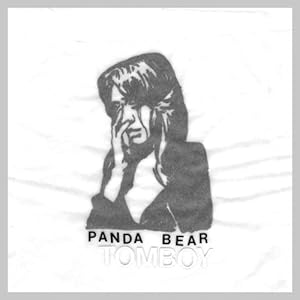
This is a case where I'd probably have a hard time really identifying and explaining why I liked this album so much, or why I'm so comfortable calling it my favorite of the year anyway. I'm also noticing just how many of these artists are heavily using synthesized elements and becoming mildly concerned. But it's all probably pretty simple. I've mellowed out and don't really look for aggression in my music much these days, and a lot of artists who grew up when popular music was no longer exclusively relying on traditional instruments are finding new ways to use different sorts of sounds and create something unique and meaningful with them. Tomboy is not really unique, but it's finely crafted and infectiously entertaining throughout.
Favorite Song: "Afterburner"
Tuesday, January 10, 2012
Best Movies of 2011
I was pretty awful about going to the theater this year before autumn rolled around, but I did okay after that and Netflix helped me catch up on a bunch of movies from earlier in the year. This is probably the first year that I've seen at least ten movies I'd consider very good before the year actually ended since... ever. I think it was a solid year, considering I enjoyed all of the Marvel movies and none made the cut.
Best of 2011
10. Source Code
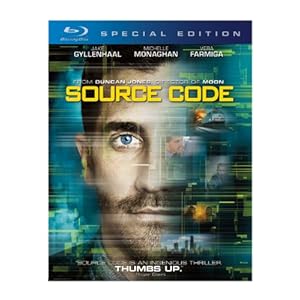
Duncan Jones' second science fiction film is more accessible than his first, and that's not a bad thing when the core idea behind it is still totally solid. The advertising made me really skeptical, but the material ended up working a lot better than expected, and supported a moving human story without overshadowing it. This might be the first time I've seen Jake Gyllenhaal in a heroic leading man type-role, and he does a good job playing a guy who's not perfect but has a good heart and a good head on his shoulders. He carries a movie that's a bit brief but totally memorable.
9. Bridesmaids
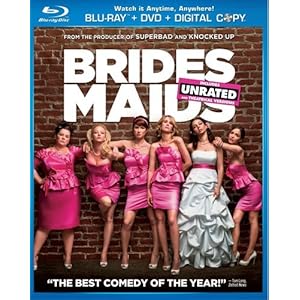
Maybe one of the most successfully gender-neutral comedies ever made, Bridesmaids is laugh-out-loud funny without ever forgetting to tell an honest and occasionally really harsh story about a woman gliding through life who starts to see how many things are broken when her best friend gets engaged. The performances are great, and there are very few moments in the film that seem ill advised or that don't at least serve the story. Not the easiest comedy to watch, but a very worthwhile one.
8. Attack the Block
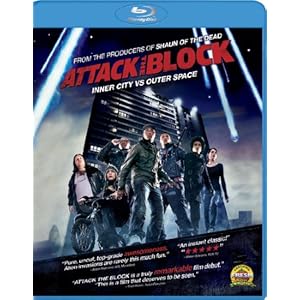
The second best movie about kids trying to survive aliens appearing in their neighborhood this year, Attack the Block combines elements of horror, sci-fi, and comedy expertly to create an experience that is more original and distinctly of a time and place than maybe anything on this list. Some bits are maybe a bit heavy-handed, but the thuggish teenagers are likable, the aliens are scary, and the film succeeds at pretty much everything it attempts.
7. The Tree of Life
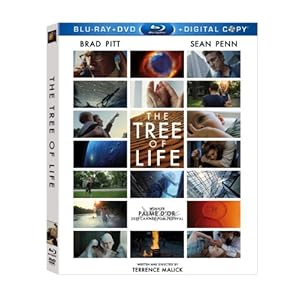
The Tree of Life is less about really understanding what's going and more about just soaking in an experience that Terrence Malick puts on the screen. I can't claim to understand everything that happens in this movie or how certain parts related to each other, but it's always beautiful to look at and I found myself at times profoundly affected by how well certain elements of life, particularly growing up, were captured, understanding things that I wasn't aware anyone besides me could remember. If you let it grab you, it's hard to get it to let go.
6. The Adventures of Tintin

An adventure film so relentlessly fun and exciting that I almost breathed a sigh of relief once the credits started rolling. There's not a lot of meat on these bones, but what is there is always driving forward with a sense of innocent wonder, asking "why not?" and latching onto possibilities that live action productions just wouldn't have the budget to try out. Steven Spielberg maybe isn't as deep as some of the other famous directors, but when he can still make movies as sharp and enjoyable as this one (along with the help of hundreds of animators, I'm sure), I still can't help but consider him one of the best alive at his job.
5. Hugo
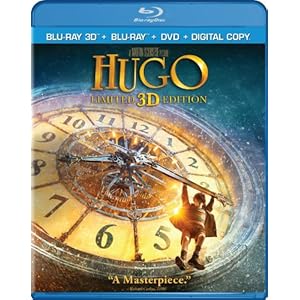
A movie that made me believe in the possibilities of 3D again. Although it's mostly about kids, Hugo is one of Martin Scorsese's most personal movies, reveling in his love of cinema, both overtly and more discretely with the way it celebrates and pays homage to what has come before. The cast is solid, the story is intriguing with a sweet sentimental core at its center, and it's hard to overstate just how nice the movie is to look at, whether you paid for the 3D tickets or not. In case you forgot, Scorsese can do a lot more than gangster movies.
4. Super 8
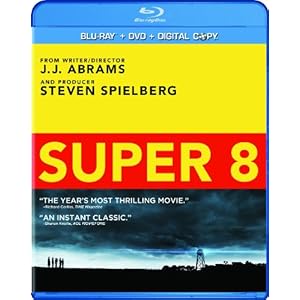
This was my most anticipated movie of the last summer, and it delivered on pretty much every expectation. It combines the more charming elements of older family science fiction movies with the more visceral thrills of something closer to horror, and does so without either side really getting short shrift or feeling underdeveloped. There's not much here that hasn't been done before, but usually it just isn't done this well, and I had a hard time worrying about small problems when the whole thing was just sitting right with me otherwise. And it's hard to get over just how good the kids in it were.
3. Warrior

The biggest surprise of the year was just how much I ended up loving this movie, despite it resting on material that sounds like a mix of movies made for Lifetime and TNT. The simple fact though is that Gavin O'Connor knows what he's doing behind the camera, and he had three actors working for him who fit their characters perfectly, and were simply great in their roles. It's not the most realistic sports story, and it doesn't have the benefit of being based on anything true. But the human element that drives it makes it work, and it's so spot-on emotionally that the end result is much more powerful than I was expecting.
2. The Girl with the Dragon Tattoo
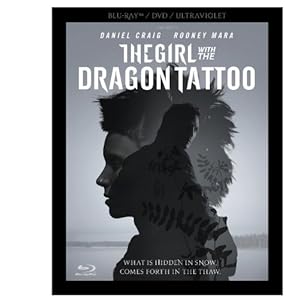
Another case of the people behind a film elevating relatively mundane (if notably popular and gritty) material, although in this case it was pretty much entirely expected. David Fincher is able to apply a specific feel and general standard of quality to his work without ever getting too flashy or obvious with it, and that continues with Dragon Tattoo, the first film in a planned trilogy that he actually hasn't signed on to finish yet. I can only hope he does, but I can't imagine having to get through parts two and three done by someone else, wondering what he could have done with it. The two leads give totally magnetic performances, and it's just so well shot and scored that numerous flaws inherent in the story just don't add up to much in the end.
1. Drive
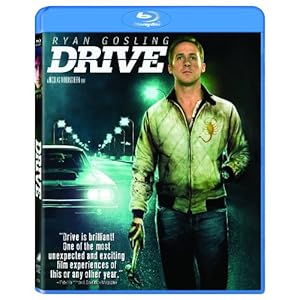
I'm giving you a night call to tell you how I feel
I want to drive you through the night, down the hills
I'm gonna tell you something you don't want to hear
I'm gonna show you where it's dark, but have no fear
There's something inside you
It's hard to explain
They're talking about you boy
But you're still the same
Monday, January 9, 2012
Best Games of 2011
Being employed for all of 2011 might not have been great for my free time, but it did allow me the freedom to try out pretty much any new game I was interested in, which worked out pretty well. I don't think I've ever managed to play this much new stuff around when it came out before. I haven't finished playing a couple of these games yet, which would normally mean they wouldn't make the list, but I feel I've played both of them enough to say about where they stand compared to the other stuff.
Best of 2011
10. L.A. Noire (Multi)
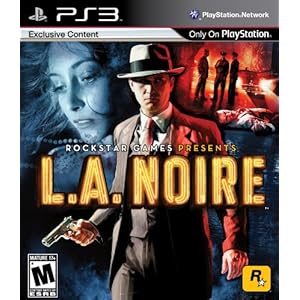
I don't look back on this as fondly as other games on the list, but a lot of that is probably reaction to all the horrible stuff we heard about the game's development and a bit of revisionist history. At its core, Noire is a very fun game that managed to mix adventure game-style mysteries with open world action effectively. The post-war Los Angeles setting was realized beautifully, the facial animation is pretty staggering, and the tale it weaves has all the elements of classic film noir. There are plenty of small issues, but the experience matches the ambition well.
9. Battlefield 3 (PC)
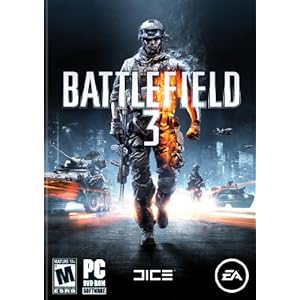
It's really too bad that beyond the graphics, sound design, and a few standout moments, the campaign of Battlefield 3 is otherwise so bland and fails to take advantage of what makes the franchise unique, because they could have helped make the game one of the best shooters in a long time. Instead, it's merely memorable as something that failed in its ambition to beat Call of Duty at its own game. The multiplayer saves it, though, combining all the best elements that they've found over the years into something addictive, rewarding, and very fun to play, whether you can maintain a decent kill ratio or not. And man, it really does look and sound fantastic.
8. Batman: Arkham City (Multi)
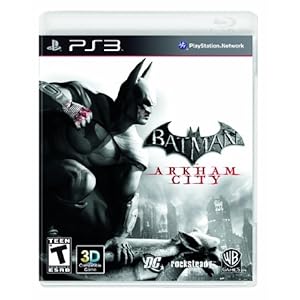
For an open-world game, Arkham City isn't that big, with a map that only takes a few minutes to get across even if you have to glide all the way around its weird shape, and not much to do beyond the main story besides collecting a whole ton of Riddler trophies. But the core gameplay they brought back from the last game is still so good, that actually playing it beats most open-world games on the market. The combat and stealth get a better chance to shine when there's more groups of goons to stumble across, and the more focused stuff once you get indoors is still a lot of fun. It would be hard to capture the thrill of being a super hero better than this.
7. The Witcher 2: Assassins of Kings (PC)
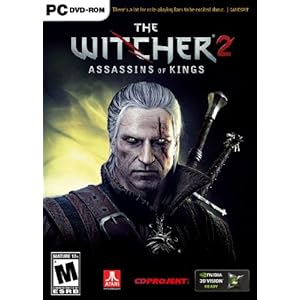
The first game in the series had a lot of cool ideas, but it was ultimately a bit hamstrung by its nature as a sort of strange European RPG by a first-time developer. They used that experience very well though in crafting the sequel, a much better game that smooths over some of the rough edges well enough to let the good stuff underneath really shine. The game looks fantastic, with graphics that compliment the visual design and impress without being flashy, and the gameplay is a solid mix of discovering and learning about the game's world with a combat system that is tough but fun and rewarding. A really nice success story.
6. Deus Ex: Human Revolution (PC)

Another surprisingly good sequel, Human Revolution learns from the mistakes of the last game that tried to follow up on the original classic and stays true to what was actually interesting about it while updating things that needed updating for the modern day. The game is not without significant flaws, notably in the design of the boss fights, but the core experience is so solid that it's hard not to get sucked into it. The game is really meaty, with plenty of interesting content and very little in the way of filler, giving you twenty solid hours of science fiction roleplaying and action and allowing for a variety of approaches to almost every situation. It's hard to really connect with the story, but the act of playing it is always compelling.
5. The Legend of Zelda: Skyward Sword (Wii)

I feel like the Zelda series has gotten a raw deal from many gamers in the last few years, perhaps starting with some backlash there was towards Twilight Princess when it came out earlier in the Wii's existence. Some complaints about the way they've decreased freedom and increased the tedium are valid, but I think sometimes these people are looking for something that they're just not going to get from the series anymore, which has always been meant to be friendly to kids. Taking into account changing standards and some of those now-systemic flaws though, I think Skyward Sword is perhaps the best game in the series since Majora's Mask. After a slow opening, the game opens up, and there's a lot of fun to be found in its world. Trying to tell an origin story again makes for a pretty interesting narrative, the use of motion controls is better justified, and the dungeons are as fun as ever. It's not the game-changing Zelda people probably wanted, but what it is is a very fun and comfortable adventure.
4. Bastion (PC)

A lot of times I get really into smaller games like this despite the gameplay, because their stories and presentations are unique and enchanting. That's true here, but the actual game part is really good as well. Bastion is a short but satisfying action RPG that hooks you both with its myriad of fun weapons and powers and all the ways it has to enhance the whole experience, from the unique setting and art style to the wonderful soundtrack and the unforgettable narration. And it might just have the most affecting story of any game on this list.
3. Uncharted 3: Drake's Deception (PS3)
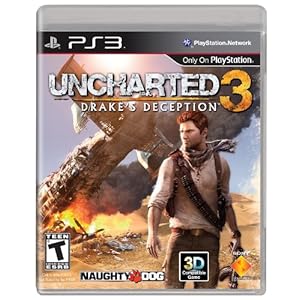
I find it odd that Uncharted seems to be held to a totally different narrative standard than other action games. Most of the time it's fine for a shooter or platformer to jump all over the world for very little reason, but since the characterization and voice acting in Uncharted is so good, people expect consistency in the plot too, and complain if a part of the game is only there because it's cool and certain threads get lost in the shuffle by the end. I understand hoping for a little more, it just seems unfair to me. Anyway, Uncharted 3 isn't the revelation that Uncharted 2 was because of course it isn't, but it still manages a fun mix of shooting, jumping, and puzzle solving, it's still funny and exciting, and its big moments are still staggering in their technical complexity and ability to impress. If it's Naughty Dog's last Uncharted game, it's a great note to go out on.
2. The Elder Scrolls V: Skyrim (PC)
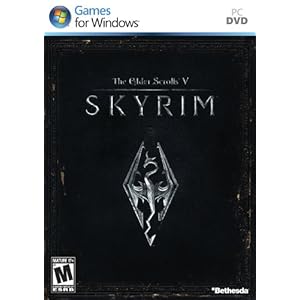
I played Oblivion for well over one hundred hours and called it my favorite game of 2006, so you know when I say that Skyrim is better in almost every way, I must really think something of it. It again captures the joy of exploring and getting to know an immensely large world, but improves on pretty much everything about that experience. Skyrim is a land with an intriguing history and sense of culture, and it's absolutely filled to the brim with cool stuff to do. There are six major questlines all with their own little twists and wrinkles, and their stories are generally much more interesting than what you'd find in the earlier games. There's more side stuff to do, and the basic experience of finding a dungeon and then raiding it for all of its treasures is more fun and less repetitive. If there's one thing the game doesn't do as well, it's come up with individual quests that feel as special at certain memorable moments. But the overall feeling of playing the game for many, many hours is undeniably superior.
1. Portal 2 (Multi)

I said Portal 2 was my favorite game of this generation of hardware, and I stand by it. It's just the right length, with its story mode being a significant chunk of content lasting just the right length, and the co-op being a meaningful addition. The puzzles are just as mind-bending as before, relying less on reflexes and more on your ability to think through a problem, and having plenty of new tricks and elements to keep things fresh the whole time. The story is funny and intelligent, expertly told in ways both direct and indirect, with well-written dialogue being superbly delivered by the small voice cast and the environment being carefully crafted to tell you everything about Aperture you'd ever want to know without saying a word. It's just the best example of both good game design and good execution of that design on this list, and it's my favorite game of the year.

































